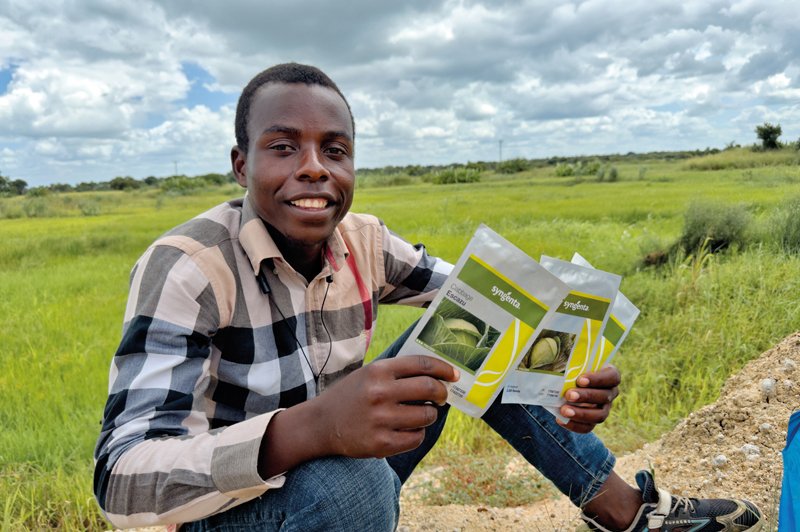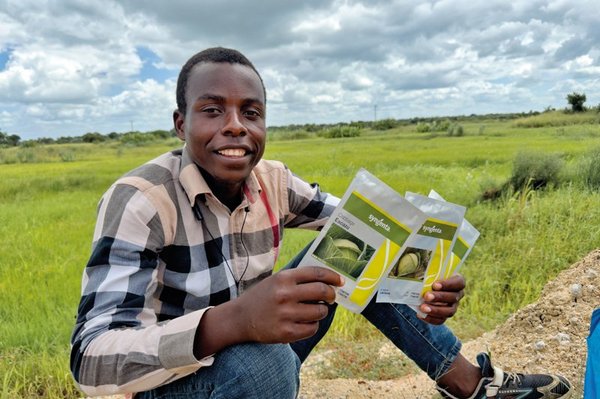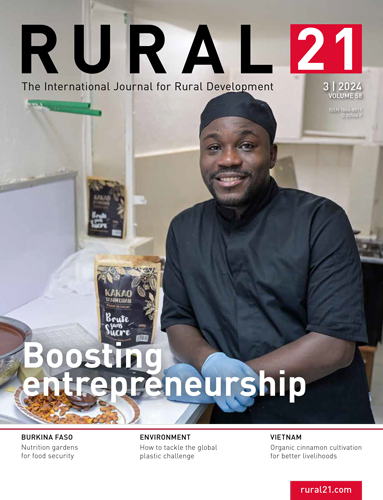 Download this article in magazine layout
Download this article in magazine layout
- Share this article
- Subscribe to our newsletter
From fields to fortune – transforming rural youth into entrepreneurial innovators
“One of the major challenges in Malawi is that we are educated to be employed,” laments a district youth officer. “Only if we were trained to be employers, then I believe farming would have been one of the biggest sources of employment.” This sentiment underscores a common issue. Traditional education programmes still often fall short in preparing youth for the dynamic world of entrepreneurship. While technical skills are crucial, the ability to innovate, adapt and persevere in the face of challenges is equally vital. Entrepreneurial mindset training goes beyond imparting technical knowledge; it instils resilience, creativity, communication and problem-solving skills essential for entrepreneurial success. But being an entrepreneur is no easy feat, particularly in the rural regions of sub-Saharan Africa, where challenging macroeconomic conditions, inadequate infrastructure and unsupportive government policies can make running a viable business incredibly difficult. Entrepreneurs in these areas often struggle with limited access to finance and essential resources, which hampers both the initiation and growth of their ventures.
An entrepreneurial spirit is key for youth to establish their own businesses within these challenging and dynamic contexts. While many competences can be trained in an action-based classroom training, the methods of a training are also essential for developing them. Innovative training formats can effectively convey entrepreneurial skills and knowledge in engaging and practical ways. What sounds straightforward in theory is a big challenge in practice, especially when reaching out to a high number of youths with diverse backgrounds and experiences.
Embracing resilience, creativity and resourcefulness
“Before the training, I wasn’t sure if I could make money by trading perfumes and soaps. So many people here are doing the same,” recalls Matilde Calima from Sofala province in Mozambique. However, her perspective shifted after participating in Personal Initiative Training (see Box at the end of article). “During the training, I learned that one can stand out of the competition,” she explains. “I learned to be creative and how to approach customers. And it works.” This training emphasises resilience, creative thinking and overall building on one’s personal initiative empowering Calima and others to navigate the challenges of starting and running their own business.
In the training programme, Matilde Calima learnt how to rely on her entrepreneurial strengths.
Photo: Ondra Menzel
For example, access to finance is a significant barrier for many youths. While training cannot solve this systematic problem, it can provide valuable lessons to overcome financial obstacles. “I always thought you need a lot of starting capital to begin your own business. But in the training, I learned that you can start with your own resources and grow, so I don’t have to wait,” shares Maite Elija, who attended Personal Initiative Training with Calima. This shift in mindset, from focusing on external limitations to leveraging existing resources, is a key aspect of Personal Initiative Training. Maite’s experience reflects this change, as he explains: “The training inspired me to create and sell my own products, like a new drink made from banana and egg, now sold at the school canteen. I am able to identify business opportunities now.”
Maite Elija acts on his own initiative to improve seed quality for farmers in Mozambique.
Photo: Ondra Menzel
Hands-on learning boosts teamwork while challenging gender norms
Entrepreneurial soft skills don’t always require direct instruction within training content; instead, they can be effectively imparted through the delivery method of the training itself, as both the Burkinabé AgroBootCamp and Malawi’s Bee Keeping Camp demonstrate. Participants not only engage in classes focused on hard skills like agroecology and beekeeping techniques or business and financial management, but also live, cook and exercise together, establishing a collaborative environment to foster soft skills such as communication, understanding and critical thinking. Inken Adrian and John Harawa are co-steering the Bee Keeping Camp in Malawi. “The interactive and multidimensional nature of our training model allows youth to enhance their soft skills, particularly teamwork,” they explain. “Including interactive opportunities can be immensely beneficial in technical trainings to build the necessary soft skills.” Through a hands-on approach of using elements of traditional methods and local materials in bee keeping, young people learn how to capitalise on opportunities within their resource constraints.
Moreover, the AgroBootCamp in Burkina Faso offers practical experiences through internships with local businesses after a week of learning and living together. This encourages quick and creative thinking and resilience through on-the-job problem solving and prepares participants for the challenges of entrepreneurship and future employment. These internship opportunities are created mainly within the food transformation sector, where employers are often looking for motivated youth members who might be able to join their team, thus creating a win-win opportunity for both the intern and companies looking for future employees as well as publicity.
Both AgroBootCamps and the Bee Keeping Camps prioritise inclusivity and diversity by ensuring representation from diverse groups. This requires sound communication with the local communities to send young people and to ensure equal representation of men and women. For women who bring their children, childcare is offered. And barrier-free facilities are chosen to include young people with disabilities. Further by encouraging equal participation from both men and women in all activities, such as cooking, cleaning and learning together, they challenge traditional gender norms in a practical and embedded way. This creates an inclusive environment as well as a supportive atmosphere conducive to entrepreneurial growth.
Another approach to impart entrepreneurial skills is “learning-by-doing”. The training programme Gigatonne motivates youth in rural communities in Kenya to team up and build a compost business to supply farms and grow food. It offers on experiential training and funding to take business action. The team members design and test prototypes and scale their impact while collaborating with various local stakeholders, including the government, businesses and community. By testing and trying, the participants develop essential skills such as collaborative action, problem-solving, stress management, storytelling, prototyping and resource mapping. The ultimate goal of the compost businesses is to contribute to job creation, food security, improvement of the local environment and the reduction of greenhouse gas emissions.
Holistic training programmes educate rural entrepreneurs
Fostering an entrepreneurial mindset among rural youth is undeniably a critical component of entrepreneurship promotion, especially in rural areas where formal employment opportunities are scarce and the business environment is unstable. Youth need the option to improve their entrepreneurial skills, both through specific training content and experiential learning methods to achieve their entrepreneurial dreams. The stories of Calima and Maite highlight how interactive trainings empower youth to overcome challenges, leverage existing resources and identify viable business models, having the skillset and mindset base for a promising entrepreneurial future.
However, it’s crucial to recognise that this endeavour cannot be confined to a singular approach. Capacitating and connecting the local entrepreneurial ecosystem’s actors, such as training providers, agricultural extensionists or incubation hubs, in delivering such innovative content and applying action-based methods can impart entrepreneurial soft skills at scale. Overall, by embracing a multifaceted approach that combines technical skills with mindset development and practical experiences rooted in an inclusive entrepreneurial ecosystem, rural youth can truly unlock their full potential as catalysts for economic empowerment and employment creation.
The training programmes – facts and figures
Personal Initiative Training has qualified 9,000 entrepreneurs and employees throughout 20 countries. Within two years, they experience a 30 per cent increase in profits, showing significant long-term training effects. The Programme was developed at Leuphana University of Lüneburg, Germany, and is implemented by the move gGmbH Entrepreneurship Training Institute.
In Burkina Faso, the AgroBootCamp has trained 4,000 youth. Within six months, 80 per cent of the entrepreneurs start and develop their business, creating 2.4 new jobs on average. AgroBootCamps are implemented by the French development consultancy Djouman and the Burkinabé association Beo-Neere Agroécologie.
The Bee Keeping Camp has skilled 200 youths in Northern Malawi alone. It is implemented by the Malawian association Forum for Apicultural and Agricultural Development (FAAD) and GIZ.
Over a 24-month period, Gigatonne has trained and supported 95 teams world-wide, involving around 1,000 individuals who have collectively reduced over 2,181 tons of CO2 emissions, benefiting 3,250 families from the bottom 20 per cent of the socio-economic bracket. The programme was launched in 2020 by the British social enterprise 10-in-10. Its mission is to tackle ten global challenges in ten years, starting with climate change.
The 360° Agri-Jobs Approach
The trainings to foster an entrepreneurial mindset have been rolled out as tools of the 360° Agri-Jobs approach by Deutsche Gesellschaft für Internationale Zusammenarbeit (GIZ) in Kenya, Malawi, Mozambique and Burkina Faso and as such are embedded in a holistic approach that promotes rural youth employment. The approach targets the entire labour market in the agri-food sector. In addition to entrepreneurship promotion, it brings labour market-relevant content into vocational education. Young jobseekers learn what kind of employment and support opportunities exist in rural areas and how to build a professional network.
More information: www.agrijobs.snrd-africa.net
Lukas Marx works as an advisor on Monitoring and Evaluation and Youth Employment Promotion at Deutsche Gesellschaft für Internationale Zusammenarbeit (GIZ) in Bonn, Germany.
Tessa Robinson is a junior advisor in GIZ’s global biodiversity implementation project.
Contact: lukas.marx@giz.de




Add a comment
Be the First to Comment